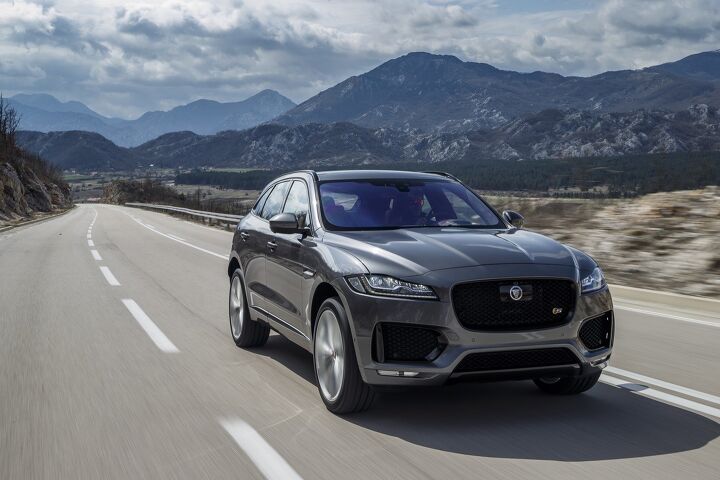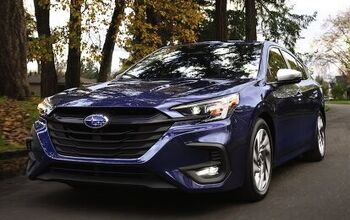Don't Say You Saw This Coming: Jaguar Now Earning 11 Percent of U.S. Volume With Diesel
Jaguar’s U.S. sales averaged 3,400 units per month over the last year, a huge turnaround after a decade in which Jaguar’s U.S. dealers sold roughly 1,200 cars per month.
Most of the credit for Jaguar’s U.S. resurgence belongs to the brand’s first-ever utility vehicle, the F-Pace.
A fair chunk of the credit also belongs to the XE, the first entry-level sedan in Jaguar’s lineup since the X-Type disappeared after the 2008 model year.
And some of the credit belongs to an engine formula that’s earned more than its fair share of negative press over the last two years: diesel.
During the first half of 2017, diesel-powered models accounted for 11 percent of Jaguar’s U.S. volume, up from nil in the first-half of 2016.
Just as the F-Pace pieces together the largest swath of Jaguar buyers, so too the F-Pace earns the lion’s share of diesel sales at Jaguar. Of the 2,251 diesel-powered Jaguars sold in the United States in the first six months of 2017, 1,368, or 61 percent, have been of the F-Pace variety.
Jaguar also sold 258 copies of the XF with a diesel engine. Jaguar’s monthly sales report breaks down the XE’s diesel sales even further: 274 of the 625 XE diesels sold were rear-wheel drive.
Though long a diesel player in the executive car market across the pond — you’ll recall Jeremy Clarkson’s range test on Top Gear’s series 12 in a Jaguar XJ — Jaguar and diesel hardly go together in the mind of the American luxury car buyer.
Moreover, Clarkson’s diesel was a six-cylinder twin-turbo unit that shifted the big XJ from nought to 60 in less than eight seconds.
The diesel Jaguar is utilizing in its North American lineup, on the other hand, is a 180-horsepower 2.0-liter four-cylinder. Torquey? Sure. But in the midsize Jaguar sedan, the XF, Car And Driver says the diesel doesn’t exactly produce impressive forward progress. 60 mph comes up in, wait for it, keep on waiting…
8.7 seconds.
On the plus side, while Jaguar demands a $1,500 premium for diesel powerplants in the XE and XF sedans, diesel is the far more economical route in the wildly more popular F-Pace. The diesel F-Pace is $4,210 less costly than the next most affordable F-Pace.
Also distinguishing diesels at Jaguar is the dearth of available oil burners at former diesel players in America’s luxury category. There are presently no diesel engines in the lineup of Audi and Mercedes-Benz. This is now a fight between Jaguar and BMW. According to HybridCars.com, BMW has sold 2,159 diesel-powered vehicles this year.
With 2,251 diesel-powered Jaguars sold already in 2017, diesel Jags are nearly twice as common as XJs and very nearly as popular as the F-Type.
[Image: Jaguar Land Rover]
Timothy Cain is a contributing analyst at The Truth About Cars and Autofocus.ca and the founder and former editor of GoodCarBadCar.net. Follow on Twitter @timcaincars.
More by Timothy Cain
Latest Car Reviews
Read moreLatest Product Reviews
Read moreRecent Comments
- CEastwood I have a friend who drives an early aughts Forrester who refuses to get rid of it no matter all it's problems . I believe it's the head gasket eater edition . He takes great pains regularly putting in some additive that is supposed prevent head gasket problems only to be told by his mechanic on the latest timing belt change that the heads are staring to seep . Mechanics must love making money off those cars and their flawed engine design . Below is another satisfied customer of what has to be one of the least reliable Japanese cars .https://www.theautopian.com/i-regret-buying-a-new-subaru/
- Wjtinfwb 157k is not insignificant, even for a Honda. A lot would depend on the maintenance records and the environment the car was operated in. Up to date maintenance and updated wear items like brakes, shocks, belts, etc. done recently? Where did those 157k miles accumulate? West Texas on open, smooth roads that are relatively easy on the chassis or Michigan, with bomb crater potholes, snow and salt that take their toll on the underpinnings. That Honda 4 will run forever with decent maintenance but the underneath bits deteriorate on a Honda just like they do on a Chevy.
- Namesakeone Yes, for two reasons: The idea of a robot making decisions based on algorithms does not seem to be in anyone's best interest, and the thought of trucking companies salivating over using a computer to replace the salary of a human driver means a lot more people in the unemployment lines.
- Bd2 Powertrain reliability of Boxer engines is always questionable. I'll never understand why Subaru held onto them for so long. Smartstream is a solid engine platform as is the Veracruz 3.8L V6.
- SPPPP I suppose I am afraid of autonomous cars in a certain sense. I prefer to drive myself when I go places. If I ride as a passenger in another driver's car, I can see if that person looks alert and fit for purpose. If that person seems likely to crash, I can intervene, and attempt to bring them back to attention. If there is no human driver, there will probably be no warning signs of an impending crash.But this is less significant than the over-arching fear of humans using autonomous driving as a tool to disempower and devalue other humans. As each generation "can't be trusted" with more and more things, we seem to be turning more passive and infantile. I fear that it will weaken our society and make it more prone to exploitation from within, and/or conquest from the outside.



































Comments
Join the conversation
Jaguar? Who cares. Let's talk toothpaste brands...
It just gets unjaguarish at the gas bar where you have to lineup for fewer pumps with commercials. Watch out for diesel-glove on those Gucci's...